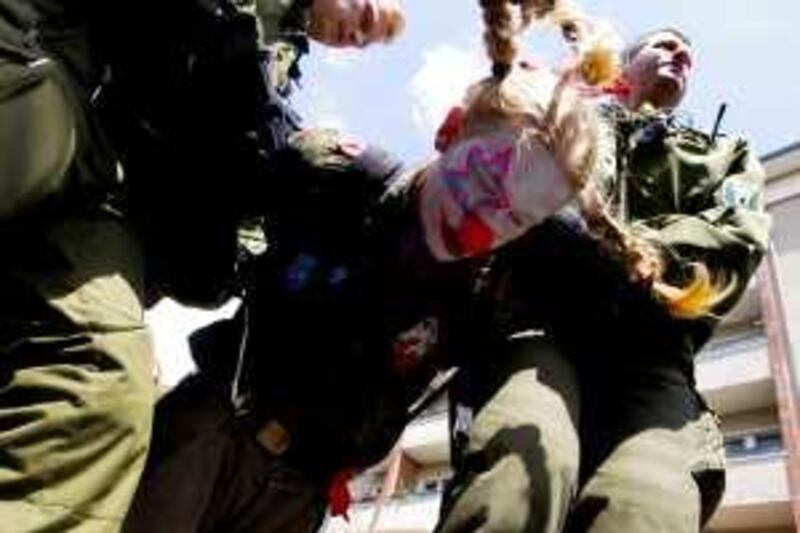BERLIN // Left-wing activists in Berlin have been setting fire to Porsches in an increasingly violent campaign against the gentrification of the city that gained a reputation for rundown, Bohemian trendiness after the fall of the Wall 20 years ago. Authorities say 169 Porsches, Mercedes and other luxury vehicles and company vans have been destroyed in arson attacks since the beginning of the year, bringing the total since 2005 to more than 1,000.
The campaigners have also been burning construction material at building sites of luxury apartments and hurling paint bombs at refurbished houses to vent their frustration at real estate developers who have been upgrading old buildings and renting them out to yuppies, a trend local people say will drive up rents and force them to move away. Police have advised Porsche drivers not to park their vehicles in Kreuzberg, a western district with many radical left-wingers and that houses squatters who have vowed in internet forums to "chase away the capitalists and reconquer our district".
One house in Kreuzberg occupied by squatters has a sign that reads: "Anyone who buys property here will buy trouble." The clash between housing developers and anti-capitalist activists who live in Kreuzberg and parts of the former East Berlin stems from mounting frustration among the local population with how the city has changed after two decades of investment. Much of eastern Berlin is looking cleaned up and has lost the transitional appearance that made it unique. The trend poses a long-term risk to Berlin's Bohemian image, low rents and vibrant cultural scene that attracted artists from around the world to live here.
The opposition to Berlin's gentrification reflects its strong left-wing streak, especially in the east where a majority of people still support the Left Party, the successor to the Communist party that used to rule East Germany. Tensions have grown sharply over the last year because of a number of high-profile luxury projects that include the construction of "Carlofts" - a patented design by two German architects that incorporates a car lift which allows residents to keep their vehicle in their apartment.
The 11 Carloft apartments cost between ?486,000 (Dh2.5 million) and ?1.3m and have been built in a rundown area of Kreuzberg where they seem out of place in a street lined with fast food outlets, internet cafes, betting shops and jobless men drinking beer in the mornings. The architects plan to build Carlofts elsewhere in Germany and around the world, including in Abu Dhabi. In Berlin, hundreds of people have protested against their construction and activists have smashed windows of the recently completed site.
Berlin is Germany's largest city by far with a population of 3.4 million, but its rents and house prices are provincial by comparison with the thriving cities of Hamburg, Munich and Frankfurt. Its unemployment rate at 14 per cent is well above the national average of 8.1 per cent in June, and the city has little industry. Most newcomers to Berlin looking for a place to live were lured by the rough charm of the Mitte, Prenzlauer Berg and Friedrichshain districts, where many buildings had grown spectacularly dilapidated after decades of neglect under communism.
But developers quickly moved in and these areas have been transformed over the last 20 years. The East Berlin grunginess has given way to shiny façades and trendy restaurants. Ordinary residents too are unhappy with recent investment plans and have joined demonstrations against them. A project worth up to ?5 billion to build office blocks and apartments on one of the last big inner-city wastelands left near the Wall - the banks of the Spree river at Kreuzberg - is on hold after 30,000 people voted against it in a local referendum.
"Berlin is starting to sell its face for money," said Peter Stulz, one demonstrator who took part in a protest against the Spree investment plans. The expensive new projects are making long-time residents insecure. "There's a feeling that we're running short of cheap apartments," said Andreas Müller, a spokesman of the Spree Pirates, a protest group. Berliners also demonstrated against the opening of the O2 World arena on the eastern bank of the Spree last year and against plans to build apartments on the site of the legendary Tempelhof airport, which was closed last year. Last month, some 1,800 police were deployed to stop hundreds of protesters from occupying the airport.
This year's leftist May Day demonstrations in Berlin were accompanied by more rioting than usual with 346 people arrested and 479 police officers injured. The violence has put pressure on Mayor Klaus Wowereit's city government of centre-left Social Democrats and the Left Party. The conservative opposition leader in the Berlin city parliament, Frank Henkel, said: "The state is capitulating in the face of left-wing terror. The radical left is testing how far it can go, and the government isn't doing anything about it."
The city government insists it is taking the attacks seriously but argues it is easy to set fire to cars unnoticed. Activists say recent news that the Carloft apartments are not selling as well as expected shows their campaign is succeeding. But the company says the financial crisis is to blame rather than paint bombs. @Email:dcrossland@thenational.ae






